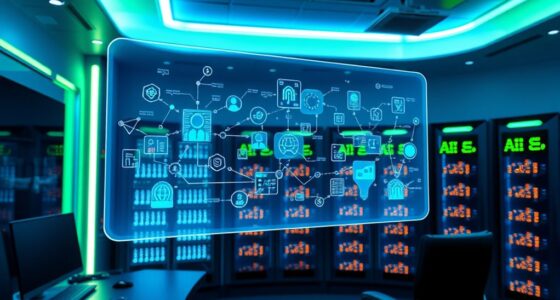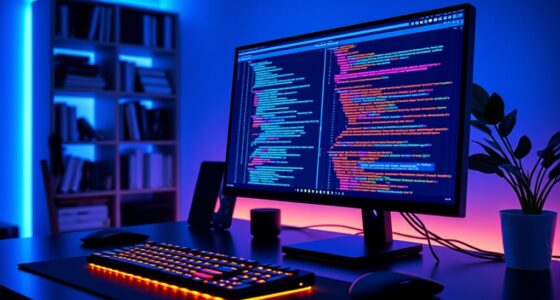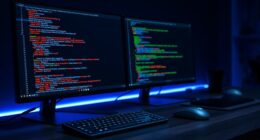Quantum computing combines quantum mechanics principles with tools like Q# and Qiskit to develop advanced algorithms beyond classical capabilities. Q# is a language tailored for quantum programming, while Qiskit provides a platform for designing and simulating quantum circuits. Both help you understand qubits, superposition, and error correction essential for reliable quantum systems. Exploring these frameworks will deepen your grasp of quantum hardware and algorithms, opening doors to more exciting concepts ahead.
Key Takeaways
- Qiskit and Q# are programming frameworks that enable developers to design, simulate, and run quantum algorithms on hardware or simulators.
- Understanding quantum concepts like superposition and entanglement is essential for effective quantum programming.
- Both platforms provide tools for implementing quantum error correction to protect qubits from noise and errors.
- Hardware considerations, such as qubit coherence and gate fidelity, influence how algorithms are optimized and executed.
- Mastering quantum programming frameworks accelerates development of reliable, hardware-aware quantum applications.

Have you ever wondered how quantum computers differ from traditional ones? Unlike classical computers that process information in bits, quantum computers use qubits, which can exist in multiple states simultaneously thanks to superposition. But harnessing this power isn’t straightforward. You need to understand the intricacies of quantum error correction and quantum hardware design to build reliable quantum systems. Quantum error correction is essential because qubits are highly susceptible to noise and errors due to their fragile quantum states. Unlike classical bits, which are relatively stable, qubits can easily lose coherence or become corrupted by environmental disturbances. That’s why quantum error correction codes are *indispensable* — they detect and correct errors without destroying the quantum information. These codes often involve encoding a logical qubit into multiple physical qubits, allowing you to identify and fix errors as they occur, ensuring the integrity of quantum computations.
Quantum hardware design plays a *fundamental* role in this process. Building a quantum computer isn’t just about creating qubits; it’s about designing hardware that maintains qubit coherence, minimizes noise, and enables precise control. You need to carefully consider how qubits are physically implemented—whether through superconducting circuits, trapped ions, or topological qubits—and how they interact. The hardware must facilitate reliable quantum gates, which are the building blocks of quantum algorithms, while also supporting error correction protocols. Effective quantum hardware design also involves cooling systems to reduce thermal noise and shielding to prevent external interference. As a developer, understanding these hardware constraints helps you write algorithms that are feasible within the hardware’s limitations and error correction capabilities.
When you’re working with frameworks like Q# or Qiskit, it’s essential to keep these hardware considerations in mind. Both platforms allow you to simulate quantum circuits, but real-world implementation depends heavily on the underlying hardware’s quality and error correction strategies. For example, Qiskit provides tools for designing and simulating quantum error correction codes, giving you insight into how they perform on actual hardware. Meanwhile, Q# integrates with Microsoft’s Quantum Development Kit, emphasizing hardware-aware programming, which helps optimize algorithms tailored to specific hardware architectures. By understanding quantum error correction and hardware design, you’ll be better equipped to develop effective quantum algorithms, troubleshoot issues, and contribute to the advancement of practical quantum computing. It’s a complex but rewarding journey, where mastery of these foundational concepts makes all the difference.
Frequently Asked Questions
How Does Quantum Error Correction Work?
You can understand quantum error correction (QEC) as a way to fix errors caused by quantum decoherence. You encode your qubits using QEC codes, which spread the information across multiple qubits. When errors occur, these codes detect and correct them without destroying the quantum data. This process helps maintain the integrity of your quantum information, ensuring reliable computations despite the fragile nature of qubits.
Can Quantum Computers Replace Classical Computers Entirely?
You won’t see quantum computers replacing classical ones entirely anytime soon—they’re not a magic wand. While quantum supremacy hints at their potential for specific tasks, classical computers excel at everyday computing. Quantum computers will complement, not replace, classical systems, especially through algorithm optimization. For now, they’re powerful tools for solving complex problems, but the future holds a partnership where both types work together to push technology forward.
What Are the Main Challenges in Scaling Quantum Hardware?
You face major challenges in scaling quantum hardware, primarily maintaining qubit coherence and achieving hardware miniaturization. Qubits need to stay stable long enough for calculations, but environmental noise often disrupts them. Additionally, shrinking hardware components while preserving quantum properties is tough. Overcoming these hurdles is essential to build larger, more reliable quantum systems capable of solving complex problems beyond classical computers.
How Secure Are Quantum Cryptography Methods?
Quantum cryptography is remarkably secure because it relies on quantum key distribution, making eavesdropping detectable like a whisper in a storm. Your encryption algorithms, protected by a quantum key, become nearly unbreakable since any interception alters the quantum state. While no system is entirely invulnerable, quantum methods profoundly elevate security, transforming the landscape of encryption. Trust in quantum cryptography, but stay vigilant—it’s an evolving frontier.
What Industries Will Benefit Most From Quantum Computing Advancements?
You’ll find industries like drug discovery and financial modeling benefit most from quantum computing advancements. In drug discovery, it speeds up molecular simulations, helping you develop new medicines faster. For financial modeling, it enhances risk analysis and optimization, allowing you to make smarter investment decisions. As quantum tech matures, expect these sectors to revolutionize how you approach complex problems, unveiling new possibilities and efficiencies across the board.
Conclusion
Now that you’ve dipped your toes into quantum computing with Q# and Qiskit, you’re standing at the edge of a vast, exciting ocean of possibilities. Remember, mastering quantum ideas is like learning a new language—challenging but incredibly rewarding. Keep experimenting, stay curious, and soon you’ll be riding the waves of this revolutionary technology. The quantum future isn’t just on the horizon—it’s waiting for you to jump in and make your mark.








